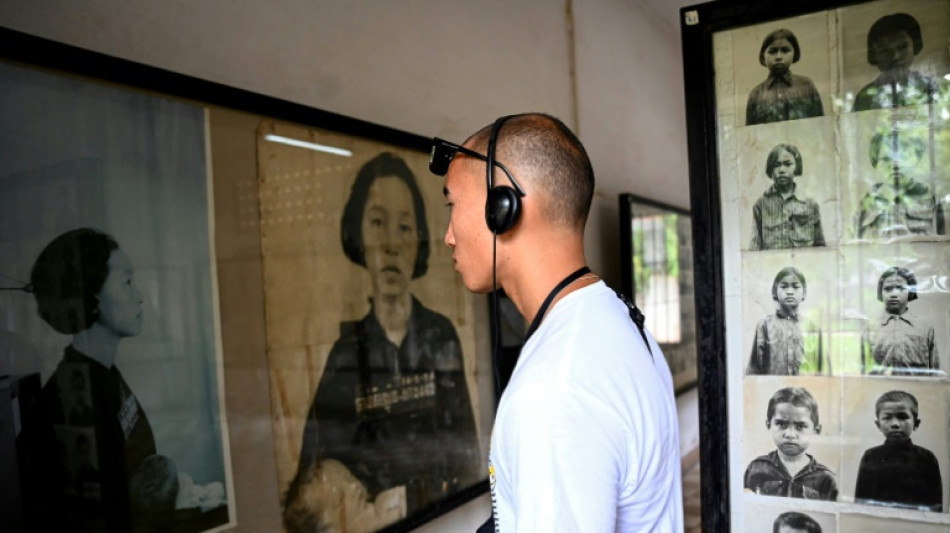
-
 Yamal heroics preserve Barca Champions League final dream
Yamal heroics preserve Barca Champions League final dream
-
2026 T20 World Cup 'biggest women's cricket event in England' - ECB
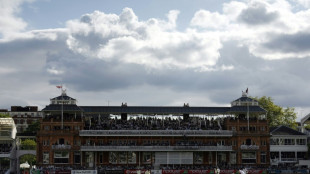
-
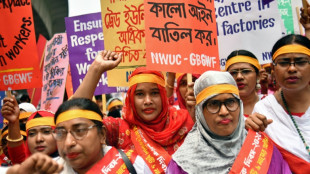 Bangladesh begins three days of mass political rallies
Bangladesh begins three days of mass political rallies
-
Children learn emergency drills as Kashmir tensions rise
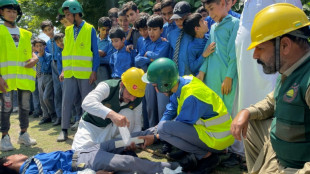
-
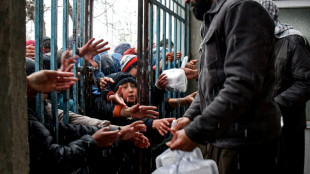 Millions of children to suffer from Trump aid cuts
Millions of children to suffer from Trump aid cuts
-
Veteran Wallaby Beale set for long-awaited injury return
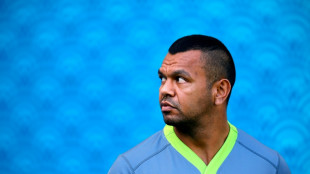
-
 Syria's Druze take up arms to defend their town against Islamists
Syria's Druze take up arms to defend their town against Islamists
-
Tesla sales plunge further in France, down 59% in April

-
 US calls on India and Pakistan to 'de-escalate'
US calls on India and Pakistan to 'de-escalate'
-
Israel reopens key roads as firefighters battle blaze

-
 Europe far-right surge masks divisions
Europe far-right surge masks divisions
-
James will mull NBA future after Lakers playoff exit

-
 Ukraine's chief rabbi sings plea to Trump to side with Kyiv
Ukraine's chief rabbi sings plea to Trump to side with Kyiv
-
Australian mushroom meal victim 'hunched' in pain, court hears

-
 Lakers dumped out of playoffs by Wolves, Rockets rout Warriors
Lakers dumped out of playoffs by Wolves, Rockets rout Warriors
-
Booming tourism and climate change threaten Albania's coast

-
 US reaching out to China for tariff talks: Beijing state media
US reaching out to China for tariff talks: Beijing state media
-
Tariffs prompt Bank of Japan to lower growth forecasts

-
 Kiss faces little time to set Wallabies on path to home World Cup glory
Kiss faces little time to set Wallabies on path to home World Cup glory
-
Serbian students, unions join forces for anti-corruption protest

-
 Slow and easily beaten -- Messi's Miami project risks global embarrassment
Slow and easily beaten -- Messi's Miami project risks global embarrassment
-
Fan in hospital after falling to field at Pirates game

-
 Nuclear power sparks Australian election battle
Nuclear power sparks Australian election battle
-
Tokyo stocks rise as BoJ holds rates steady

-
 Bank of Japan holds rates, lowers growth forecasts
Bank of Japan holds rates, lowers growth forecasts
-
'Sleeping giants' Bordeaux-Begles awaken before Champions Cup semis

-
 Napoli eye Scudetto as Inter hope for post-Barca bounce-back
Napoli eye Scudetto as Inter hope for post-Barca bounce-back
-
Germany's 'absolutely insane' second tier rivalling Europe's best

-
 PSG minds on Arsenal return as French clubs scrap for Champions League places
PSG minds on Arsenal return as French clubs scrap for Champions League places
-
UK WWII veteran remembers joy of war's end, 80 years on

-
 Myanmar junta lets post-quake truce expire
Myanmar junta lets post-quake truce expire
-
Rockets romp past Warriors to extend NBA playoff series

-
 Messi, Inter Miami CONCACAF Cup dream over as Vancouver advance
Messi, Inter Miami CONCACAF Cup dream over as Vancouver advance
-
UN body warns over Trump's deep-sea mining order

-
 UK local elections test big two parties
UK local elections test big two parties
-
US judge says Apple defied order in App Store case

-
 Seventeen years later, Brood XIV cicadas emerge in US
Seventeen years later, Brood XIV cicadas emerge in US
-
Scorching 1,500m return for Olympic great Ledecky in Florida

-
 Israel's Netanyahu warns wildfires could reach Jerusalem
Israel's Netanyahu warns wildfires could reach Jerusalem
-
Istanbul lockdown aims to prevent May Day marches

-
 Australian guard Daniels of Hawks named NBA's most improved
Australian guard Daniels of Hawks named NBA's most improved
-
Mexico City to host F1 races until 2028

-
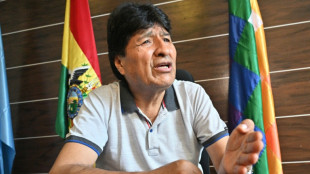 Morales vows no surrender in bid to reclaim Bolivian presidency
Morales vows no surrender in bid to reclaim Bolivian presidency
-
Ukraine, US sign minerals deal, tying Trump to Kyiv
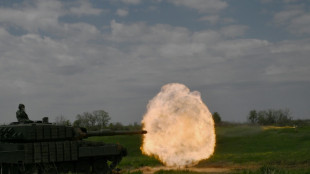
-
 Phenomenons like Yamal born every 50 years: Inter's Inzaghi
Phenomenons like Yamal born every 50 years: Inter's Inzaghi
-
Ukraine, US say minerals deal ready as Kyiv hails sharing
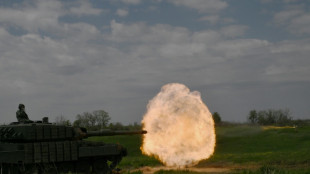
-
 Global stocks mostly rise following mixed economic data
Global stocks mostly rise following mixed economic data
-
O'Sullivan says he must play better to win eighth snooker world title after seeing off Si Jiahui

-
 Sabalenka eases past Kostyuk into Madrid Open semis
Sabalenka eases past Kostyuk into Madrid Open semis
-
Netflix's 'The Eternaut' echoes fight against tyranny: actor Ricardo Darin
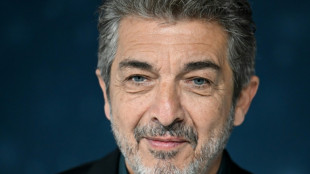

Cambodia genocide denial law open to abuse, say critics
Survivors of the Khmer Rouge's genocidal regime welcome a beefed-up Cambodian law that forbids denying the movement's atrocities, but rights advocates and academics warn it could also stifle legitimate dissent.
Enacted last month ahead of this week's 50th anniversary of the Khmer Rouge seizing the capital Phnom Penh, the law threatens hefty jail sentences and fines for anyone who denies the genocide that killed around two million people between 1975 and 1979.
The atrocities committed by the Khmer Rouge are widely accepted by Cambodians save a dwindling group of ageing former cadres and soldiers who live mostly in the remote northwest.
The hardline Maoist group led by "Brother Number One" Pol Pot reset the calendar to "Year Zero" on April 17, 1975 and emptied cities in a bid to create a pure agrarian society free of class, politics or capital.
About a quarter of the population died -- of disease, starvation, overwork or by execution -- in the disastrous social engineering experiment memorably chronicled by the 1984 Oscar-winning movie "The Killing Fields".
Some activists, however, say former prime minister Hun Sen is using the law to burnish his legacy and stifle any opposition to his son and successor, Hun Manet.
The government is trying to "reinforce state narratives rather than to genuinely encourage historical accountability", said Sophal Ear, associate professor at Arizona State University.
"In practice, it could be another tool to silence dissent," he said.
Political analyst Ou Virak called the law a "mistake", adding: "A population that is afraid to discuss will be even more afraid to ask questions."
- 'I am the peacemaker' -
Now 72, Hun Sen was a commander under Pol Pot before he fled to Vietnam in 1977, joining other Cambodian defectors to lead the Vietnamese army's assault that drove the Khmer Rouge out of Phnom Penh.
In the more than 30 years Hun Sen ruled Cambodia he stifled dissent, critics say, equating opposition to his leadership as support for those he replaced.
"Hun Sen wants to impose his vision of things, saying: 'I am the peacemaker'," said Adriana Escobar Rodriguez of the French National Centre for Scientific Research.
One form of genocide denial tended to downplay Vietnam's role in ousting the Khmer Rouge, she said, but another stemmed from the fact that some "people still can't believe that Khmers could have killed other Khmers" -- referring to Cambodia's majority ethnic group.
Hun Sen has defended the stricter law, comparing it to similar legislation against Holocaust denial in Europe.
The 2013 law it replaced stemmed from a case involving one of Hun Sen's main opponents that took place just before national elections.
Kem Sokha was accused of describing notorious Khmer Rouge prison S-21 -- where an estimated 15,000 people were tortured to death -- as a Vietnamese fabrication.
He has spent lengthy periods in prison on various charges since, and is currently under house arrest on treason charges and banned from politics.
Chum Mey, one of a small handful of people who emerged alive from S-21, sells books describing his experiences outside the former prison, which was turned into the Tuol Sleng Genocide Museum.
He says it would be stupid for anyone to deny the Khmer Rouge's atrocities.
"There is evidence," the 94-year-old said.
"They killed my four children and my wife."
F.Stadler--VB
